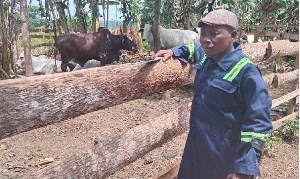In order to tackle the issue of proliferation of new districts and constituencies in Ghana, IMANI Africa in conjunction with Odekro have recommended that the payment of Common Funds to Members of Parliament be discontinued.
President of the policy think tank Franklin Cudjoe stressed the need for the common funds to be scrapped, noting that it was only sensible not to keep splurging the already scarce revenue in the system.
“This is a very commonsensical approach, I mean if you don’t have enough money, why dissipate the little that you have. As we speak district assemblies are complaining already that their due is being scrapped and taken off by the government to pursue other social interventions. So it only makes sense not to keep on splurging…” he stated
“What we’re going to do is to keep insisting… we’re going to meet the DCEs and MMDCEs in another meeting and show them exactly why we think that the MPs common fund is a waste of money. It’s actually an excuse of the MP to perpetuate himself/herself in power but not necessarily to do the most important job which is making laws. MPs are not development agents…. They’re development agents to the extent that they’re making sensible laws for us. They shouldn’t be in the gutters digging holes and doing stuff like that, that’s the job of the DCEs really...” he asserted.
The research sought to assess whether the creation of new districts over the years has actually led to development in the country.
After the research, conclusions which were drawn include;
• The “marriage” between the creation of districts and the creation of constituencies, to some extent, accounts for the proliferation of constituencies in the country.
• Most of the experts and stakeholders interviewed called for the capping of both the number of districts and constituencies, while others also advocated for the creation of a separate independent entity that would be in charge of creation of districts and constituencies.
• Some MMDAs created in the past, failed to meet the statutory population requirement yet they were commissioned and granted the legal backing to operate.
• The lack of transparency in the creation of districts have sometimes led to pocket of grievances, inter-community conflicts among others. Reasons accounting for such incidences have included, the citing of the district capital, the naming of the district, etc
The research therefore recommended that;
• Make the process for district creation and demarcation as transparent as possible with reports on the creation exercise published on Ministry of Local Government and Rural Development (in the case of districts) and that of the Electoral Commission (for constituencies).
• The EC should not be forced to create new constituencies in the event that districts are politically created (when it does not meet the stipulated criteria) to warrant a new constituency.
• Districts that have grown beyond their required threshold must be elevated to municipality and metropolitan status instead of splitting them.
• The day-to-day operations of MPs are not closely linked to that of the districts. Hence MPS should be granted membership of more than one district assemblies.
• Discontinue the MPs Common Fund
General News of Wednesday, 30 May 2018
Source: www.ghanaweb.com













